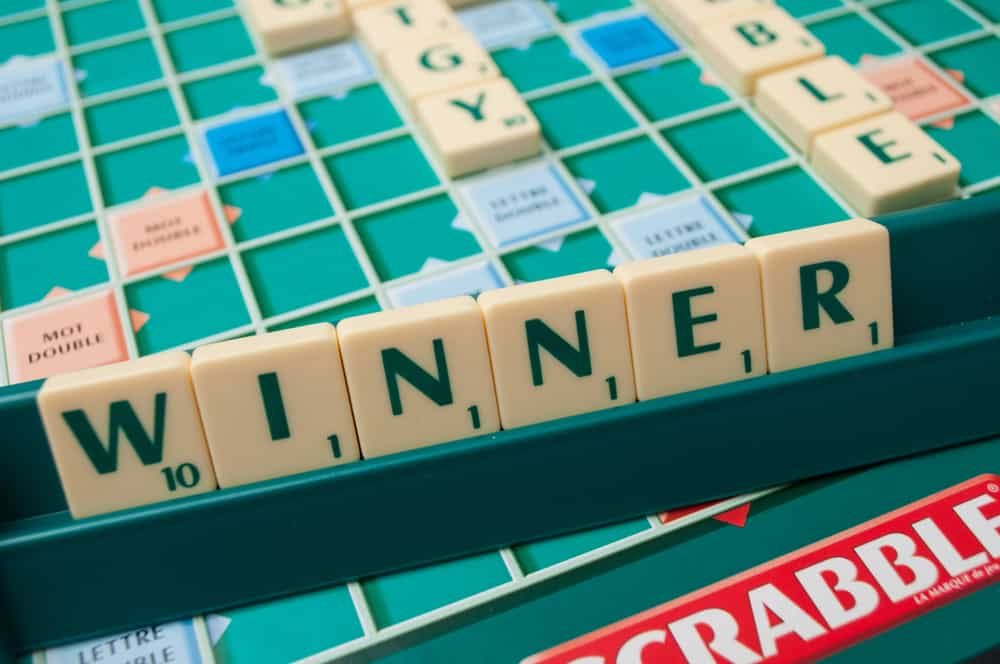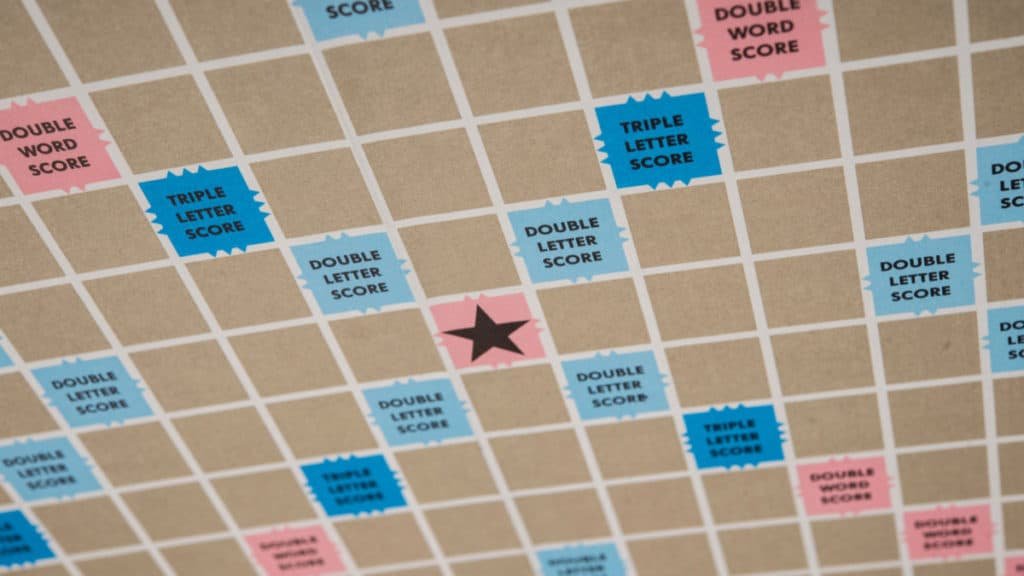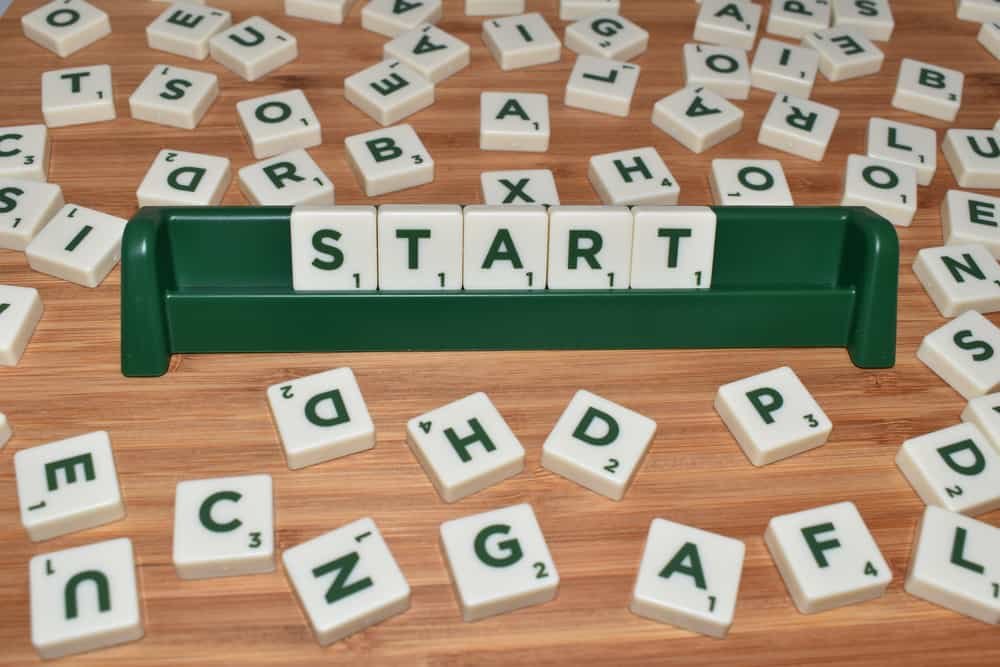Last Updated on January 25, 2024 by Gamesver Team and JC Franco

Scrabble, which is a word game for 2 to 4 players, is a fun and educational game that’s being around for quite some time. If you love playing Scrabble as much as I do and want to ensure that you start to win more regularly, there are a few tips, tricks, and strategies that you can learn to do just that. I have put a few of these tips and strategies into action and found them extremely helpful.
Playing Scrabble is, first and foremost, a game, but it is also about winning. While I personally put fun first in a game, I am also serious about winning, which is why the below-mentioned tips were a heaven-sent for me. If you are ready to improve your Scrabble game, take the time to read through each of the following tips and tricks.
How to win at Scrabble – 16 helpful tips and tricks:
1. Subscribe to a word of the day service.
One way to start winning at Scrabble is to improve on your vocab. There’s nothing tricky about this one – the only strategy is to learn more. There are various apps and online services that can send you a new word and its meaning on a daily basis. This is a good way to steadily increase your brain’s capacity to learn and also to retain new words.

2. Keep a close eye on the following tiles on the board:
| 1. | E | 11.16% |
| 2. | A | 8.50% |
| 3. | R | 7.58% |
| 4. | I | 7.54% |
| 5. | O | 7.16% |
| 6. | T | 6.95% |
| 7. | N | 6.65% |
| 8. | S | 5.73% |
| 9. | L | 5.49% |
| 10. | C | 4.54% |
These are the most commonly used letters (and their % of appearance) in the Oxford English Dictionary, which means that they offer a great opportunity for you to form new words. Some pro-Scrabble players actually try to stockpile these letters to ensure that they can make easy words later on in the game.
3. Do not use common letters in the middle square.
At the beginning of the game, all players select a random tile before drawing their racks. The person who has the tile with the closest letter to A in the alphabet gets to go first. The first player also puts the first tile in the middle square on the board. It is quite strategic to avoid using vowels such as T, R, D, or S in the middle square. This makes it too easy for other players to take advantage.

4. Keep your knowledge current of non-vowel words.
You might be wondering why it is strategic to play words that have no vowels in them. It’s actually quite a simple strategy. Non-vowel words make it hard for other players to form new words. Some non-vowel words you should learn include the likes of dryly, crypt, cysts, and glyph, to name a few.
5. Use your Q tile as quickly as you can.
The Q tile might seem like the devil when playing a game of Scrabble, but it is not. The Q tile can make play difficult if you hang onto it for too long. Play it as soon as you see the opportunity to – do not wait for a better opportunity to come along as they rarely do.
6. Educate yourself on words that use a Q without a U before you play.
The Q is not really all that bad if you think about words that use a Q and do not need a U afterward. Some of these words include the likes of qat, tranq, qindar, qwerty, qoph, and qaid, and of course, all of their associated plurals. It is best to memorize these so that you can use them effortlessly during a game of Scrabble.
7. Learn a list of prefixes and suffixes.
Why do prefixes and suffixes have importance when playing Scrabble? By knowing how prefixes and suffixes work, you can add them to words to create longer words and earn more points. It is best to keep this in mind when playing Scrabble.
8. Keep a list of 2-letter words in memory.
The tips and strategies that you use aren’t always used during the actual gameplay. Some of the strategies can be from being fully prepared and knowledgeable before the game even happens. Before you even start playing Scrabble, memorize a list of 2-letter words to use when you need to. Some 2-letter words include the likes of an, if, at, by, do, go, he, hi, is, and so on.
9. Brush up your knowledge of vowel-heavy words before you play.

There are words in the Scrabble dictionary that mostly consist only of vowels, and these include eau, oi, aa, oe, to name a few. These are obviously strange words to look at and might not even make much sense to you. Nevertheless, they are viable words to use in the game. So learn a list of them, brush up on their meanings, and ensure that you have them handy when you need a word to use and don’t have a great selection of tiles.
10. Only discard or switch tiles if you absolutely have to.
It is possible to discard your tiles during the game or switch them. It is, however, strongly recommended that you only do this if you are desperate. Ensure that you scrutinize your tiles and the board, and make sure that you are confident you want to discard tiles.
11. Use other languages currently in the Official Scrabble Dictionary.
You might think that you can only use English words when playing Scrabble, but there are other languages that you can use too. You can find a list of words in the Official Scrabble Dictionary from other languages that you can use, including British English words such as “colour” or Anglicized French words such as “moi”.
12. Play your high-value letters before it’s too late.
At the end of the Scrabble game, letters that you have not played will be subtracted from your final score. Ouch, right? As the game starts to wear on, having high-value tiles lying around becomes risky for you. Play these tiles as soon as you can.
13. Deploy “S” tiles along with “E” tiles.
Just slapping an “S” tile onto the end of a word is a waste. Rather wait for the opportunity to use “E” and “S” tiles together.
14. Keep an eye out for hooks.

You might be wondering what “hooks” are. Hooks is Scrabble lingo for using one of your own tiles to modify another player’s word to create a new word. For example, “star” can become “start” by simply adding a “t”. When you do this, you get the points for the new tile as well as the points for all the other letters too.
15. Skip your turn strategically.
You might think that it is unwise to skip your turn, especially when the entire objective of the game is to earn as many points as possible by creating new words. That said, sometimes, it can be highly beneficial to skip a turn, especially if your current tiles only provide an opportunity to earn very few points. After the next player goes, there could be new opportunities to earn a large number of points.
16. Read as much as possible.
One of the ways that you can naturally increase your chances of winning Scrabble is to ensure that you have an extensive vocabulary and excellent spelling skills. One way to ensure that you have these skills is to read as much as you can. The more you read, the more your brain will be exposed to words and spelling, which really does come in handy when playing Scrabble.
Last Word
By using these tips and tricks, you can increase your chances of winning at Scrabble exponentially. The next time you play the game, remember these tips, put them to use, and show your opponent what you are made of! Soon, everyone in the family will be keen to challenge you to prove their superiority at the game! Keep practicing and, of course, good luck!

